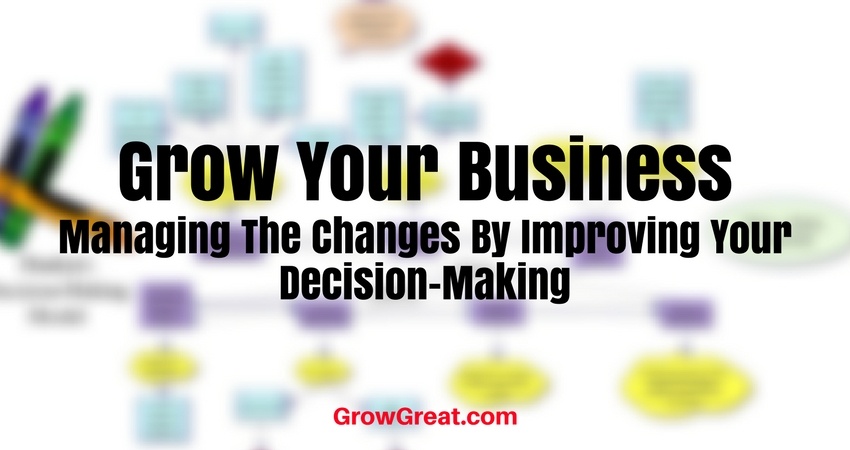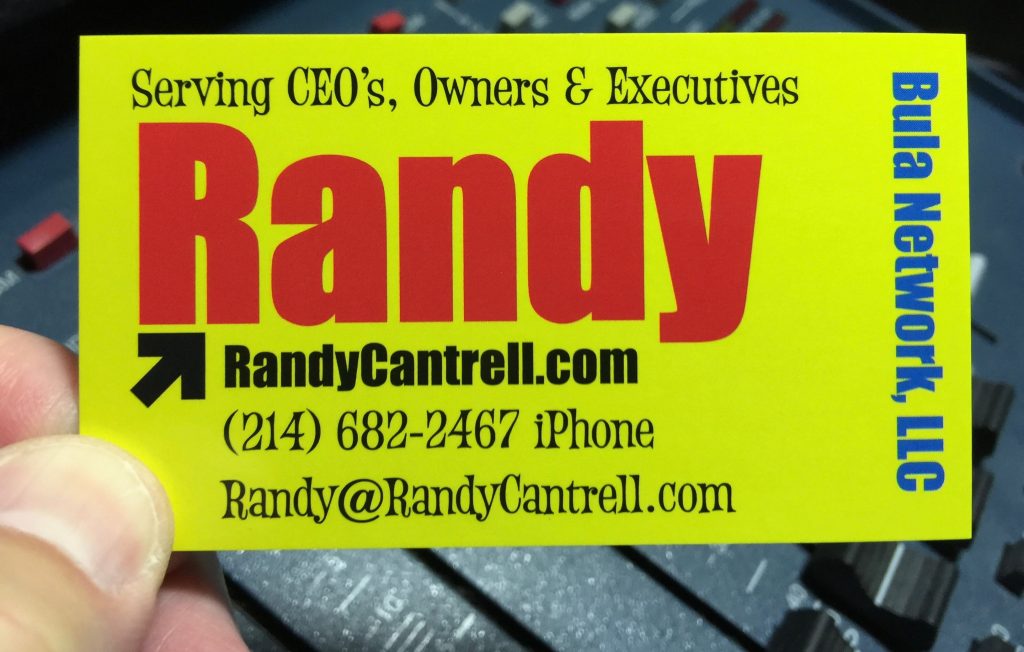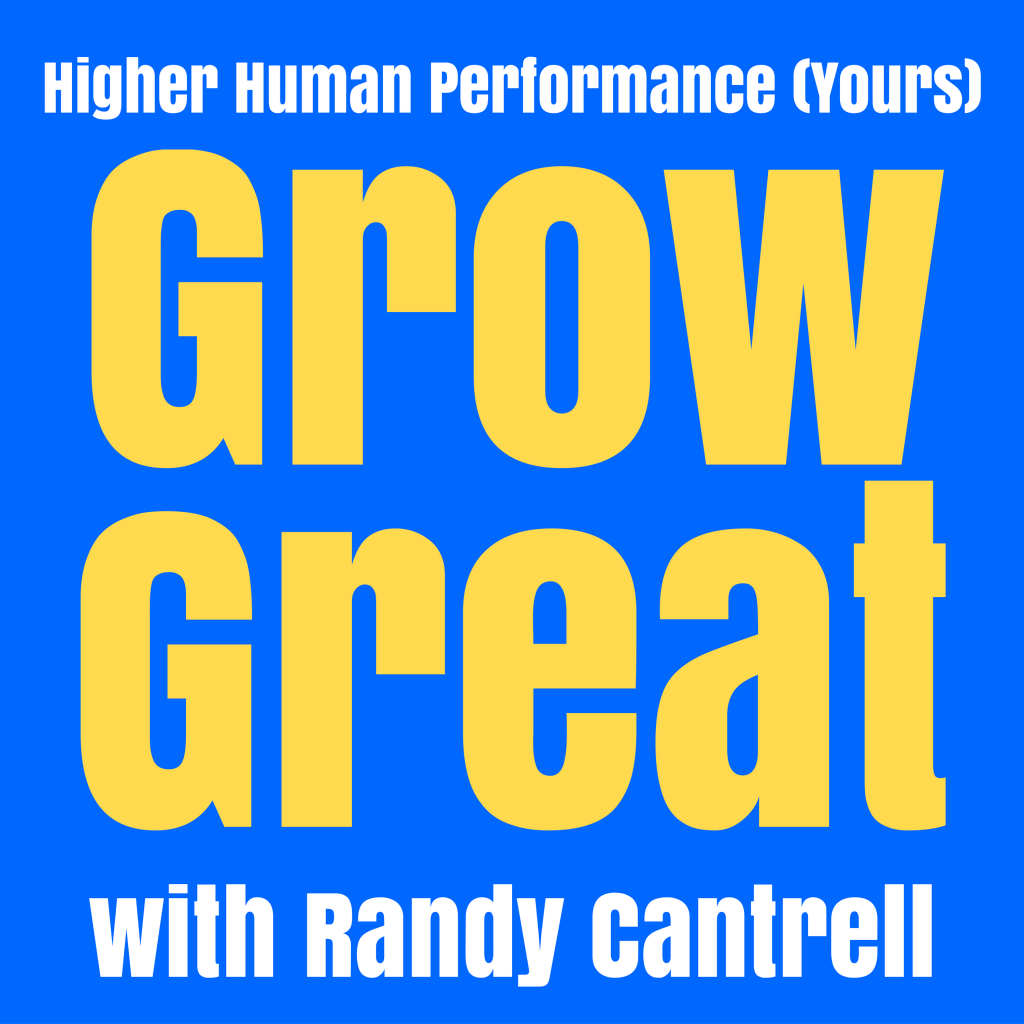TPA5034 – Grow Your Business: Managing The Changes By Improving Your Decision-Making
Podcast: Play in new window | Download (Duration: 24:58 — 23.1MB)
Subscribe: Apple Podcasts | Spotify | RSS | More

Business is summed up in the trifecta of business building: getting new customers, serving existing customers better and not going crazy in the process.
You’ve owned and operated your business for almost a decade now. Like most, those first years were touch ‘n go. Moments of exhilaration followed by periods of…well, near despair. You didn’t care. It was going to happen or you were going to die trying. It’s the commitment every founder experiences. The energy required to break away from earth’s orbit is immense. So it is with every business owner at the beginning.
Thankfully, around year 4 you started feeling like this was going to actually work out. Success started being somewhat predictable. And new challenges started popping onto your calendar. Growing pains.
Finding good employees. Training them.
Generating more sales to feed the beast. Sales are in constant need of attention. If not sales themselves, margins! There’s always pressure, but you’ve just got to figure out new ways to generate predictable results.
Operations challenges abound. Basic things like answering the phones promptly and correctly, to following through on customer service corrections.
There are days where you feel like you’ve been in a 3-day knife fight. You feel bloodied, exhausted and you even catch yourself sometimes questioning the pain of it all. You know you’re not going to quit, but there are days where you start questioning your sanity.
So it goes with the trifecta: getting new customers, serving existing customers better and not going crazy in the process. For years you’ve lived by the mantra, “If it is to be, it’s up to me.” You’ve embraced that because mostly it’s true. Sure, you’ve got some really terrific people. You’ve also got some not so great people. And you’ve got some really solid outside people who serve you like your attorney and CPA. Your contact list has never been bigger, or broader. But the changes and growth (and the challenges) have somehow put you on the “Be Careful Island.” This is where every business owner finds themselves as the business grows, expands and gets increasingly more complicated. You’re the #1. You know what you know and you’ve got to be careful about who you talk with, and what you talk about. It sparks a feeling that’s more of a question, “Is there a better way?” So you wonder.
I don’t know any business owners who has felt differently. We only know what we know. It’s our experience. Each day we’re living our life, both real and imaged (in our head).
You’re smart. Experienced. Wise. There are some things you’ve known most of your life – since you were just a child. Friends matter. Acquaintances, too. Family certain matters. All these people in your life serve a vital role for you. They always have. There’s just this thing that has happened since forming your business. You’re living a different life. Marching to a different drummer as a business owner. Not everybody understands what you understand because they’re not experiencing the same thing. They struggle to relate. You struggle to help them relate.
Mostly, your drive to grow your business hasn’t slowed. If anything, it’s amped up higher over time. What was once thought impossible in those early days is within reach today. And what might tomorrow be if we could only solve a few key issues? It’s exciting to think about.
Pressure builds. You’ve got more employees than you’ve ever had. Costs continue to rise. Margins are always under pressure. Just the other day you sat back in your chair lamenting that you’re putting out fires you thought you had already put out. They somehow continue to smolder and flame up again. Over and over. “Just once I’d like to fight a new fight,” you said to yourself. It seems the same things that vexed you yesterday are still vexing you today.
You’re not ready for help because it’s in your DNA. You’re the Captain. This is your ship. You’re in charge. “If it is to be, it’s up to me!” Besides, only weaklings need help. But deep down you know that’s completely false. You learned it when you just a kid. The people around you make all the difference in the world. Except, now you’re lacking some really important people because your station in life is different today.
Let’s consider all the roles ascribed to people who may be able to help. These are merely definitions. There’s no judgment here because this is a judgment-free zone!
Mentor – an experienced and trusted adviser
Peer – a person who is similarly equal to another in some way (my definition as it pertains to The Peer Advantage)
Coach – one who instructs or trains
Consultant – one who gives professional advice or services
Advisor – one who counsels
Confidant – a person with whom one shares a secret or private matter, trusting them not to repeat it to others
Friend – a person whom one knows and with whom one has a bond of mutual affection
You’ve got people in your life who have filled one or more of these roles. You know their names. You know what value they delivered to your life. You may not have thought of them using these titles, but it’s not about the names as it is the functions. The service!
Daily leaders just like you face many decisions. The organization is waiting on you for the decision. Some are big, most aren’t. Some are critical, others seem almost insignificant. Doesn’t matter. They still need to be made. Because until a decision is made everything is on pause. Or stop. And business can’t grow if we’re paused or stopped. You can’t grow if you’re paused or stopped.
Change surrounds you. Remember the morning you got a text before you even left the house? You got blind-sided with an issue that wasn’t even on your calendar. Suddenly, the change dominates your day (maybe longer). Your daily life is like a commuter driving to work in a car that’s perfectly fine. Until he has a tire blow out. Tires weren’t on his mind. His tires were fine. Until they weren’t. Now, he’s shopping for tires and trying to figure out when and how to get this problem solved. This is your life. Except it’s much more complicated than buying a new tire. That decision is easy!
Change dominates every business and every market. As the leader, your ability to help your company navigate that change is crucial to your future. Yesterday’s success is something for which you’re thankful, but it’s not going to get you where you want to go. Ever present on your mind are your employees and customers. Many people are depending on you. Decisions have consequences. Or rewards. And some changes require decisions for which there are no “do over’s.” You must get it right or suffer significant pain.
This is where insight and deeper thought would really help you. So some quiet time. Asking hard questions of your direct reports. It’s all helpful. But is it enough? Maybe. Maybe not.
The best way to manage change is to manage your decision-making. How can you do that? There are many ways. I don’t suppose it’s a one-size-fits-all kind of a deal. But I do know there’s one resource that every single business person could benefit from – joining forces with other business owners who are all experiencing similar feelings, thoughts, and challenges. People with whom you can easily relate. People who understand what you’re going through and are committed to helping you — because they know you’ll do the same for them.
From the foundation of our country U.S. Presidents have surrounded themselves with advisers capable of helping them see all the various sides of an issue. These advisers don’t make the decisions. That’s always resided with the President. As the #1 you are tasked with that responsibility and authority.
President Washington had some pretty good company surrounding him. Names like Thomas Jefferson, Alexander Hamilton, and John Adams. Do you have any doubt that President Washington relied on these, and other men, to help him see things more clearly? To examine perspectives he may not have considered on his own? Every U.S. President has been and still is currently surrounded by people who provide insights, perspectives, differing viewpoints and other useful services in order to help him make better decisions.
You’re not running a country, but your decisions are important. Their impact is big. You owe it to your company, yourself and everybody who is impacted by your decisions to grow, improve and transform so your business can grow great. U.S. Presidents have seemingly limitless resources to put people around them who they feel will best serve them, and our country. You’re at a disadvantage. Sorta.
I’m going to introduce another phrase that incorporates one of those titles of people who serve us, The Peer Advantage. This is an important one because frankly, it encompasses each of those earlier roles or titles: mentor, peer, coach, consultant, adviser, confidant, and friend. The Peer Advantage is all of these roles wrapped up into one. When we seize an opportunity for The Peer Advantage we’re in a safe place where nothing we do or say will used against us. Where we can speak freely from our heart about what’s troubling us, or where we need help. Where we can brag about our successes and be given words of affirmation to fuel our confidence to even higher levels. Where we can learn and teach. Where we can listen and speak. Where we can be helped and help. Where we can sit side by side with people who get us and respect us. And people who deserve that from us, too.
The outcome – the result – is perhaps the most powerful decision-making improvement tool ever. And it’s not based on technology or a fast computer. It’s not math or science-based. It’s not digital, it’s analog. It’s people helping people. It’s people willing to be served and willing to serve. It’s small. Intimate. Personal. POWERFUL.
The Peer Advantage isn’t about people telling you what to do. It’s about people asking questions to help you figure out what’s best for you to do. It’s people pushing each other to achieve heights they may have never thought possible.
You make many investments in your business. Maybe you buy merchandise. Sometimes you make a great buy that will garner extraordinary margins. They don’t come around nearly often enough, but when they do — you’re excited. Everything you do has a cost. And a return. Sometimes the return is negative. Things don’t always work out.
The Peer Advantage has a cost/reward just like anything else. You’ve likely heard that adage about pointing the finger at somebody. When you do, you’ve got 3 more pointing back at yourself. That’s a 3:1 negative ROI. Well, The Peer Advantage is at the very least a 7:1 ROI because it consists of 7 business owners who are all committed to their growth and improvement. Like you, they want to make the best decisions possible as they navigate the changes in their industries and companies. Like you, they’re willing to let others help them see things more clearly by asking questions and sharing experiences. And like you, they’re also willing to provide that help to the others in the group. The Peer Advantage is likely the smartest room you’ll ever enter because the power is the collective. It’s the room. It’s the total group working jointing together to push their businesses to new levels of financial success.
But honestly 7:1 is the bare minimum ROI. Have you ever made a decision that had a 6-figure outcome? How about a 7-figure outcome? Sure. It happens. What if a decision were impacted by a question you’d not considered? Or by a shared experience that was outside your own experience? What if you made a decision based on insights you hadn’t considered before – insights provided by somebody else (as Dr. Henry Cloud calls them, “The Power Of The Other”) – resulted in a 6-figure more favorable difference? Or a 7-figure more favorable difference? The ROI can (and often does) soar over time as the collective becomes tighter and better able to serve each other. It’s like that credit card company slogan, “Priceless.”

Subscribe to the podcast
 To subscribe, please use the links below:
To subscribe, please use the links below:
- Click Here to Subscribe via iTunes
- Click Here to Subscribe via RSS (non-iTunes feed)
- Click Here to Subscribe via Stitcher
If you have a chance, please leave me an honest rating and review on iTunes by clicking Review on iTunes. It’ll help the show rank better in iTunes.
Thank you!
TPA5034 – Grow Your Business: Managing The Changes By Improving Your Decision-Making Read More »




 They embrace social media and pay close attention to the phony messages of a world gone amuck with success, high achievement and out-of-the-world accomplishment. Then they look at themselves and are dissatisfied. The lie of the world takes a heavy toll on life. We don’t measure up. We look like a loser compared to what we see happening all around us.
They embrace social media and pay close attention to the phony messages of a world gone amuck with success, high achievement and out-of-the-world accomplishment. Then they look at themselves and are dissatisfied. The lie of the world takes a heavy toll on life. We don’t measure up. We look like a loser compared to what we see happening all around us.



